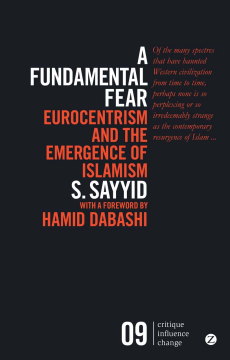
Additional Information
Book Details
Abstract
The fear and anxiety aroused by Islamism is not a myth, nor is it simply a consequence of terrorism or fundamentalism.
Writing in 1997, before 9/11 and before the austerity that has bred a new generation of far right groups across Europe and the US, S. Sayyid warned of a spectre haunting Western civilization. This groundbreaking book, banned by the Malaysian government, is both an analysis of the conditions that have made ‘Islamic fundamentalism’ possible and a provocative account of the ways in which Muslim identities have come to play an increasingly political role throughout the world.
This is a pioneering, provocative and intricately crafted study, which shows the challenge of Islamism is not only geopolitical or even cultural but also epistemological.
S. Sayyid is a reader in rhetoric at the University of Leeds. He is the founding editor of ReOrient: The Journal of Critical Muslim Studies. His publications include Recalling the Caliphate and the volume (co-edited with AbdoolKarim Vakil) Thinking through Islamophobia.
'Sayyid's book has considerable intellectual and personal drive, showing how the adoption of a poststructuralist perspective can alter our perception of important matters of cultural politics' - Nations and Nationalism
'A theoretically sophisticated attempt to read contemporary Muslim political identities as a symptom of Eurocentrism's decline' - Global Society
'A welcome change ... should be of great interest to those who wish to look at the phenomenon of political Islam and the divination of the clash between the West and the rest from a more sophisticated and theoretical angle ... a worthy contribution.' - Impact International
'Sayyid, with this dense and seminal work, has made a welcome attempt to reframe the uses of the term Islam within intellectual discourses without resort to populist terminology. The book is a broad treatment of the state of Islam and its relationship with the West and the West's relationship with the East ... takes a fresh look at how Islam has reached its much-maligned status ... Not only is [Sayyid] polemical, incisive and engaging, he is at times poetical. His use of metaphor and analogy serves to illustrate the complexity of the issues that he is putting across' - Sociology
'If we were to take up the suggestion of Norberto Bobbio that classics are those works able to speak to us in any time and any space, then this book should almost certainly be included in a list of contemporary classics ... Although both Islamists and Orientalists have constructed an opposition between the West and Islam, this myth is convincingly deconstructed by Sayyid's argument - and the book leaves us with little doubt this dichotomy is a major simplification of the historical processes of the last century.' - Contemporary South Asia
Table of Contents
| Section Title | Page | Action | Price |
|---|---|---|---|
| Front Cover | Cover | ||
| critique influence change | i | ||
| More Critical Praise | iii | ||
| About the Author | iv | ||
| Title Page | v | ||
| Copyright | vi | ||
| Dedication | vii | ||
| Contents | ix | ||
| Foreword by Hamid Dabashi | xi | ||
| Preface to the critique influence change Edition | xiv | ||
| Notes | xx | ||
| Acknowledgements | xxi | ||
| Preface to the Second Edition | xxii | ||
| Islamism, Terror of the World | xxiv | ||
| The Islamist Impasse? | xxviii | ||
| De-Centred West | xxx | ||
| Waiting for the Caliph | xxxiii | ||
| Islamism and Globalization | xxxiv | ||
| Islamism and Empire | xxxvi | ||
| Notes | xxxviii | ||
| Prologue | 1 | ||
| Besieging Vienna Again | 3 | ||
| Notes | 6 | ||
| 1: Framin’ Fundamentalism | 7 | ||
| Theorizing Fundamentalism | 8 | ||
| Explaining ‘Islamic Fundamentalism’ | 18 | ||
| Narrating Islamism and the Crisis of the Political Order | 23 | ||
| Notes | 26 | ||
| 2: Thinking Islamism, (re-)Thinking Islam | 31 | ||
| Anti-Orientalism and Islam | 36 | ||
| The Matter of Islam | 41 | ||
| Islamism: Islam as a Master Signifier | 46 | ||
| Notes | 49 | ||
| 3: Kemalism and the Politicization of Islam | 52 | ||
| The Institution of the Caliphate: Fixing Islam | 53 | ||
| Abolition and Reaction: Floating Islam | 57 | ||
| Modernizing Islam: Ataturk’s Way (1923–45) | 63 | ||
| The Impact of Kemalism | 69 | ||
| Availability and Hegemony | 74 | ||
| Conclusion | 77 | ||
| Notes | 78 | ||
| 4: Islam, Modernity and the West | 84 | ||
| The Weakening of the Kemalist Hegemony | 84 | ||
| Modernity and Islamism | 88 | ||
| Modernity and the West: The West and the ‘Rest’. | 99 | ||
| Modernity: Anti-, Post-, Counter- | 105 | ||
| Islam and Postmodernity? | 111 | ||
| Decentring of the West and Islamism | 113 | ||
| Notes | 120 | ||
| 5: Islamism and the Limits of the Invisible Empire | 127 | ||
| The Triumph of the West | 130 | ||
| Eurocentrism and Ethnocentrism | 133 | ||
| Eurocentrism and Particularities | 135 | ||
| Contested Genealogies | 143 | ||
| Conclusion | 150 | ||
| Notes | 151 | ||
| Epilogue: Islamism/Eurocentrism | 155 | ||
| Notes | 160 | ||
| Bibliography | 162 | ||
| Index | 179 | ||
| Back Cover | Back cover |
